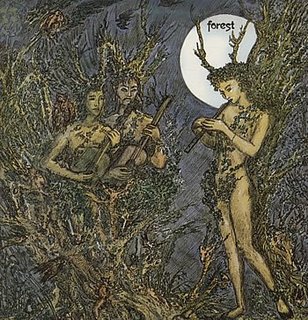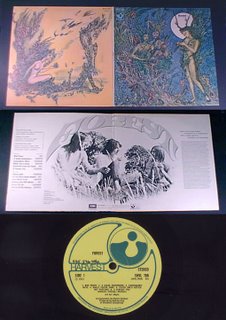 forest - forest (uk, 1969)
forest - forest (uk, 1969)Issued by Harvest in 1969, this is one of the definite debut folk albums of all time. "As the 1960s progressed, almost every musical genre was affected by the psychedelic boom -- and folk was no exception. Forest, whose two Harvest albums have long elated listeners and eluded collectors, featured prominently among them, and have become synonymous with so-called 'acid folk', inspiring -- alongside Vashti Bunyan, COB and a handful of others -- the current wave of successful underground folk acts. This, their debut album was recorded at Abbey Road early in 1969 and featured completely original material, with their strangely-sculptured melodies and partially improvised accompaniment. Originally called The Foresters Of Walesby the band abbreviated their name to Forest and were fortunate enough to meet John Peel at a local gig and he encouraged them to play in London. After a triumphant gig in Notting Hill's All Saints Hall at Christmastime 1968, Forest were offered a management deal with Blackhill Enterprises, home to amongst others, Pink Floyd and Roy Harper. It wasn't long before offers of record contracts came their way and the band eventually signed to EMI's nascent Harvest label.
Cuando uno se adentra en frondosos y escondidos parajes sueña con perderse, en un día suerte, en un bosque y escuhar entre los árboles: 'Lovemaker's Ways', 'Bad Penny', 'Sylvie (We'd Better Not Pretend)', 'Glade Somewhere' o 'Fanding Lights', rústicas, sombrías y medievales melodías que un trío de trovadores multinstrumentistas recogió para Harvest y que Radioactive ha recuperado en limitados lp's como ya ha hecho con otras gemas, también BGO ha unido su debut con su otro album 'Full Circle' de 1970. Las mágicas noches en el bosque se esculpen en psych-folk, acid-folk, mandolinas, clavicordios, flautas, armonios, percusiones, armónicas, 12 cuerdas y pianos, así se adivina la sombra de The Incredible String Band, Dr. Strangely Strange y Trees, se cuela el surrealismo, lo arcano y lo pagano, los trovadores del folk lisérgico... pero los bellos y delicados arreglos con ese tono silvestre a lo Clive's Original Band iluminan la oscuridad de un sueño del que no quieres despertar.
Martin Welham: vocals, 12 string guitar, harmonium, piano, pipes, percussion, organ
Derek Allenby: mandolin, harmonica, pipes, harmonium, percussion, vocals
Hadrian Welham: guitar, mandolin, vocals, pipes, cello, electric harpsichord, harmonium, percussion, mandolin, organ

 spires that in the sunset rise - this is fire (secret eye, 2006)
spires that in the sunset rise - this is fire (secret eye, 2006)

